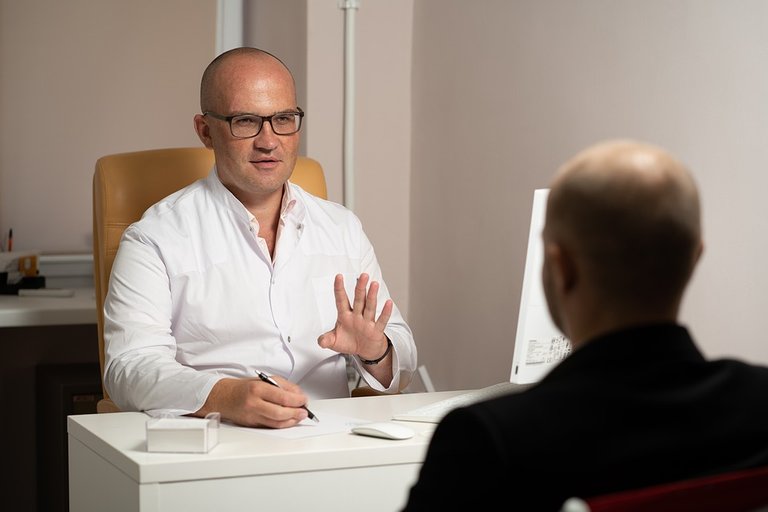
Fuente Imagen
When we are no longer able to change a situation, we face the challenge of changing ourselves.
-Victor Frankl-
TEXT IN ENGLISH
Carlos, without any unforeseen stopovers, arrived home and did his routine chores and received as usual the usual sermon from his mother. He also told himself that in spite of Heraclitus and his theory of life as a constantly flowing river, his existence seemed immovable. He had already finished reading the book The Mysterious Case of Dr. Jekill and Mr. Hyde, which had made him reflect on his therapist's personality, but he needed something to give him a better perspective.
He remembered again the phrase that he repeated so often on the way back: "as without, so within" and told himself that he had to dig deeper. Francisco was not a simple duality, there was something else in his personality that he had not been able to decipher. Things had been reversed, now he was the psychologist, pondering about his therapist's personality. He had recently been able to install internet at home thanks to a sister and nephew who lived abroad. Of the three siblings he had, she was the most supportive.
He took advantage of St. Google, the most powerful saint of the contemporary era - it could be because he achieves everything - to investigate terms that would allow him to study and better define Francis. After hours of rambling and even looking at ponographies, he came across a typology that he had overheard some time ago in a conversation with friends and had not pointed out, the one that spoke of perverse narcissists.
He also got a term that made a lot of noise, the word in question was anhedonia: which refers specifically to those people who do not enjoy life. That term defined very well how he felt for some time now, even the things he loved the most were losing their meaning. That is precisely why he sought help. However, and as he defined himself, he was an eventful being, reality, at least his own, always took an unexpected turn. Needless to say that with his therapist that fact was happening again.
He stopped thinking about himself, and continued to investigate what was appropriate in relation to Francisco. The first thing he had to do was to differentiate or classify in which psychopathic or psychiatric typology he could be placed. Was he a psychopath, a sociopath or did he belong to another category?
Sociopaths were more abundant as a percentage of the population. Their problem was relational, the disease was developing through their environment, producing a gradual affectation until the disapproval of which they are always the object, in some of them triggered murderous impulses that caused the tragedies that in recent years have unfortunately occurred.
Most of the time, they lack a stable professional and even working life, they are impulsive, they sometimes generate connections with certain individuals and groups on which they often end up pouring their resentment. As a typical characteristic, they are not at all careful and act impulsively almost all the time. When they reach these behavioral extremes their crimes are crude, they always leave evidence because they want to destroy humanity and destroy themselves.
It was the turn of psychopaths, he learned that they were much rarer than sociopaths - approximately one percent of the world's population - their pathology was of innate origin, with a high probability that some ancestor suffered from that anomaly. In other words, heredity played a fundamental role in the beings with this condition. In general, they tended to be well educated, with a successful professional career. They were very controlled and even cold in their reactions, and above all they mastered the art of manipulation at all levels.
Something worth noting was that they did not create real personal or affective bonds, their relationships were always false, even if the other people involved believed so. They were calculating, did not take unnecessary risks and liked to participate in frauds in a veiled way, without appearing with their true identity. The highlight of their behavior is that they all know how to cover up their evidence.
Carlos did not have to continue investigating, it was clear that Francisco was a psychopath and he was very much a sociopath. What was he going to do now with all that information, he still had to investigate the traits of the narcissistic pervert, which was a specific type of psychopathy. An empiricist maxim says that: all living beings leave traces and through those traces our past acts can be read. It was very simple, he had to become a Sherlock Holmes level investigator.
The phone rang and Carlos picked it up immediately. When he realized who it was, he felt a shiver run through his body, it was none other than his therapist.
To be continued...
TEXTO EN ESPAÑOL
Carlos, sin hacer escalas imprevistas, llegó a su casa y realizó las tareas rutinarias y recibió como siempre el acostumbrado sermón de su madre. Se dijo asimismo que a pesar de Heráclito y su teoría la vida como un río que constantemente fluye, su existencia parecía inamovible. Ya había terminado de leer el libro del Misterioso caso del Dr Jekill y Mr. Hyde que lo había hecho reflexionar sobre la personalidad de su terapeuta, pero necesitaba algo que le diera una mejor perspectiva.
Recordó otra vez la frase que tanto se repitió en el camino de regreso: “como es afuera es adentro” y se dijo que tenía que indagar más profundamente. Francisco no era una simple dualidad, había algo más en su personalidad que no había logrado descifrar. Las cosas se habían invertido, ahora el psicólogo era él, cavilando sobre la personalidad de su terapeuta. Recientemente había podido instalar internet en su casa gracias a una hermana y su sobrino que vivían en el exterior. De los tres hermanos que tenía, ella era la que más lo apoyaba.
Aprovechó a San Google, el santo más poderoso de la época contemporánea -será porque todo lo consigue- para indagar términos que le permitieran estudiar y precisar mejor a Francisco. Después de horas de divagar y hasta de ver pornografía, dio con una tipología que hace tiempo por casualidad escuchó en una conversación de amigos y no había puntualizado en ella, la que hablaba de los perversos narcisistas.
También consiguió un término que le hizo mucho ruido, la palabra en cuestión era anhedonia: que se refiere específicamente a esas personas que no disfrutan de la vida. Ese término definía muy bien como se sentía desde hace un tiempo para acá, hasta las cosas que más amaba estaban perdiendo el sentido. Por eso precisamente busco ayuda. Sin embargo, y como él mismo se definía, era un ser acontecido, la realidad por lo menos la suya, siempre daba un giro inesperado. Ni que decir que con su terapeuta que ese hecho estaba volviendo a ocurrir.
Dejó de pensar en sí mismo, y siguió investigando lo que correspondía en relación a Francisco. Lo primero que tenía que hacer era diferenciar o clasificar en qué tipología psicopática o psiquiátrica podría estar ubicado. ¿Era un psicópata, un sociópata o pertenecía a otra categoría?
Los sociópatas eran más abundantes en cuanto a porcentaje de la población. Su problema era relacional, la enfermedad se iba desarrollando a través de su entorno, produciendo una afectación gradual hasta que la desaprobación de la que siempre son objeto, en algunos de ellos desencadenan impulsos asesinos que ocasionan las tragedias que en estos últimos años lamentablemente se han producido.
La mayoría de las veces, carecen de vida profesional y hasta laboral estable, son impulsivos, en ocasiones generan conexiones con ciertos individuos y grupos sobre los que muchas veces terminan volcando su resentimiento. como característica típica, no son para nada cuidadosos y actúan impulsivamente casi todo el tiempo. Cuando llegan a esos extremos conductuales sus crímenes son toscos, siempre dejan evidencias ya que quieren destruir a la humanidad y destruirse ellos.
Le tocaba el turno a los psicópatas, se enteró que eran muchos más escasos que los sociópatas -aproximadamente el uno por ciento de la población mundial- su patología era de origen innato, con mucha probabilidad de que algún ascendiente padeciera esa anomalía. En otras palabras, la herencia en los seres con esa condición jugaba un papel fundamental. Por lo general tendían a tener buena educación, con una carrera profesional exitosa. Eran personas muy controladas y hasta frías en sus reacciones, sobre todo dominaban el arte de la manipulación en todos sus niveles.
Algo digno de destacar, era que no creaban verdaderos vínculos personales o afectivos, sus relaciones siempre eran falsas, aunque las otras personas involucradas así lo creyeran. Eran calculadores no toman riesgos innecesarios y les gustaba participar en fraudes de forma velada, sin aparecer con su verdadera identidad. Lo más destacado de su conducta es que todos saben cubrir sus evidencias.
Carlos no tenía que seguir indagando, estaba claro que Francisco era un psicópata y él tenía mucho de sociópata. Que iba hacer ahora con toda esa información, todavía le quedaba investigar los rasgos del perverso narcisista que venía a ser un tipo específico de psicopatía. Una máxima empirista dice que: todos los seres vivos dejamos huellas y por esas huellas se pueden leer nuestros actos pasados. Era muy sencillo, tenía que volverse un investigador nivel Sherlock Holmes.
Sonó el teléfono y Carlos lo tomó enseguida. Al darse cuenta de quién era, sintió cómo le recorría por todo el cuerpo un escalofrío, era nada más y nada menos que su terapeuta.
Continuará…
Translated with www.DeepL.com
¡Gracias por leer y apoyar!

¡¡¡Recuerda visitar Freewrite House!!!
